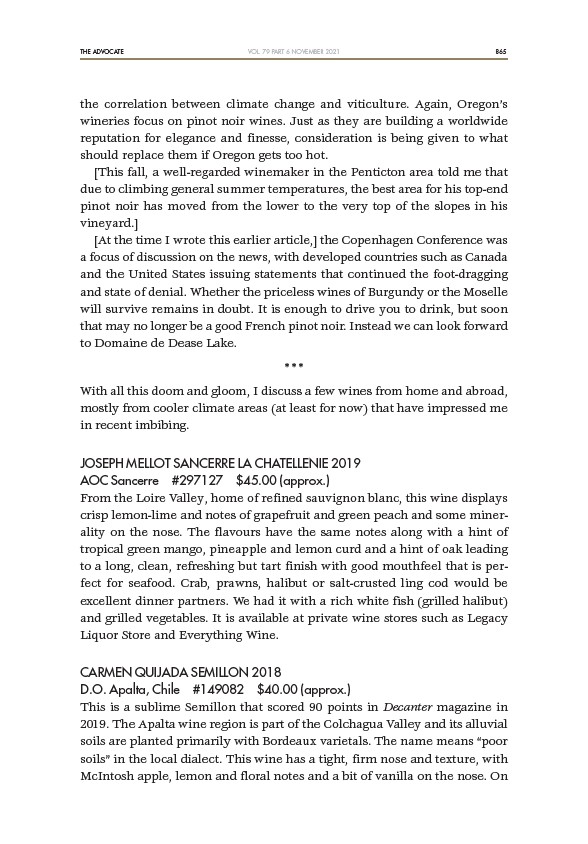
THE ADVOCATE 865
VOL. 79 PART 6 NOVEMBER 2021
the correlation between climate change and viticulture. Again, Oregon’s
wineries focus on pinot noir wines. Just as they are building a worldwide
reputation for elegance and finesse, consideration is being given to what
should replace them if Oregon gets too hot.
This fall, a well-regarded winemaker in the Penticton area told me that
due to climbing general summer temperatures, the best area for his top-end
pinot noir has moved from the lower to the very top of the slopes in his
vineyard.
At the time I wrote this earlier article, the Copenhagen Conference was
a focus of discussion on the news, with developed countries such as Canada
and the United States issuing statements that continued the foot-dragging
and state of denial. Whether the priceless wines of Burgundy or the Moselle
will survive remains in doubt. It is enough to drive you to drink, but soon
that may no longer be a good French pinot noir. Instead we can look forward
to Domaine de Dease Lake.
***
With all this doom and gloom, I discuss a few wines from home and abroad,
mostly from cooler climate areas (at least for now) that have impressed me
in recent imbibing.
JOSEPH MELLOT SANCERRE LA CHATELLENIE 2019
AOC Sancerre #297127 $45.00 (approx.)
From the Loire Valley, home of refined sauvignon blanc, this wine displays
crisp lemon-lime and notes of grapefruit and green peach and some minerality
on the nose. The flavours have the same notes along with a hint of
tropical green mango, pineapple and lemon curd and a hint of oak leading
to a long, clean, refreshing but tart finish with good mouthfeel that is perfect
for seafood. Crab, prawns, halibut or salt-crusted ling cod would be
excellent dinner partners. We had it with a rich white fish (grilled halibut)
and grilled vegetables. It is available at private wine stores such as Legacy
Liquor Store and Everything Wine.
CARMEN QUIJADA SEMILLON 2018
D.O. Apalta, Chile #149082 $40.00 (approx.)
This is a sublime Semillon that scored 90 points in Decanter magazine in
2019. The Apalta wine region is part of the Colchagua Valley and its alluvial
soils are planted primarily with Bordeaux varietals. The name means “poor
soils” in the local dialect. This wine has a tight, firm nose and texture, with
McIntosh apple, lemon and floral notes and a bit of vanilla on the nose. On